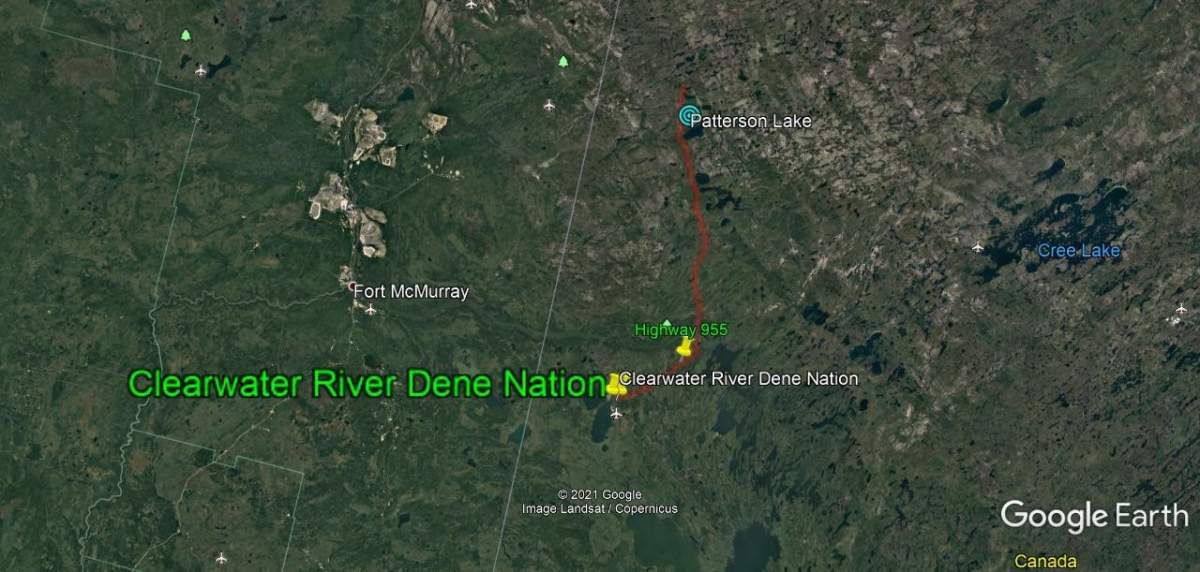A security checkpoint has been set up by a northern Saskatchewan Dene Nation over what it says are concerns over uranium exploration and COVID-19.

The Clearwater River Dene Nation said it set up the checkpoint on Highway 955 after the Saskatchewan government failed to hold meaningful consultations with them over uranium exploration north of the reserve.
CRDN Chief Teddy Clarke says the province has run “roughshod” over their rights for decades without consultation or consent.
“The issuance of uranium mineral rights and granting of exploration permits and approvals of damaging uranium mines by the (Saskatchewan government) all occurred without our People’s meaningful involvement, participation or consent,” he said in a statement.
“This pattern of unacceptable behaviour must come to an end, now.”
The Federation of Sovereign Indigenous Nations said it supports the move by the CRDN.
“The Dene people have inherent and treaty rights to live on and use these lands and waters as their ancestors have for generations,” said FSIN Chief Bobby Cameron.
“Our treaty rights trump provincial laws and we will continue to fight with Chief Clarke and the Dene people to ensure that these lands and waters are here for the generations to come.”
- Jivani’s trip to Washington has some Conservative MPs scratching their heads
- Why Canadian beer cans are ‘almost impossible’ as tariffs near 1-year mark
- ‘Doesn’t make sense’: Union files labour complaint over federal 4-day in-office mandate
- Ottawa gives Canada Post a $1.01-billion loan amid ongoing financial struggles
The Saskatchewan Ministry of Environment said it is committed to holding meaningful consultations with First Nations on any decisions or actions that may impact established treaty or Aboriginal rights.

Get daily National news
The ministry said the government is following the First Nation and Métis Consultation Policy Framework on the steps it needs to take to fulfill its obligation.
The CRDN said in addition to the uranium exploration being done without proper consultation, it is also impacting moose, caribou and migratory bird nesting areas.
CRDN band member Walter Hainault said their patience with the government is running out.
“We now have two major uranium mines being proposed in one of our Nation’s most culturally important and vital areas — the Patterson Lake Area,” he said.
“All this starts with the (Saskatchewan government) granting uranium mineral tenures, rights and exploration permits in the absence of meaningful consultation or sound analysis of its impacts on our rights, culture or people.”
The Ministry of Environment said a specific condition is attached to exploration permits requiring companies to report caribou sightings and work must stop until the animals have passed the work area.
Companies generally do exploration work outside of sensitive time periods like nesting and calving seasons, the ministry said.
The other concern for the CRDN is the COVID-19 pandemic and the need to protect families on the reserve.
The CRDN said they have experienced some of the highest rates of COVID-19 cases of all First Nations in Canada.
“Allowing uranium exploration and development work to proceed on a business-as-usual basis at this time places CRDN community members’ health and well-being at risk,” said a statement from CRDN.
The ministry said the pandemic has created challenges and that everyone is expected to follow all public health orders to curb the spread of the virus.
The ministry said a condition of an exploration permit is that companies must abide by the public health orders or delay any activities until such a time those can be completed under public health guidelines.
The CRDN says it has hired Vancouver-based law firm JFK Law over the concerns it has over the scope of uranium activity on its lands.
“The CRDN will not permit what happened in the past to occur again and they will use all means at their disposal to protect the treaty rights, culture and interests of the CRDN elders, trappers and people,” Clarke said.
“Our elders, trappers, community members and youth will have the last say over the way the land is used and how it is left for the future generations.”
The Ministry of Environment said discussions will continue with the CRDN so that it can understand better their concerns regarding uranium mining exploration in the area.
The ministry said the government is committed to ensuring its duty to consult is respected and adhered to.








Comments